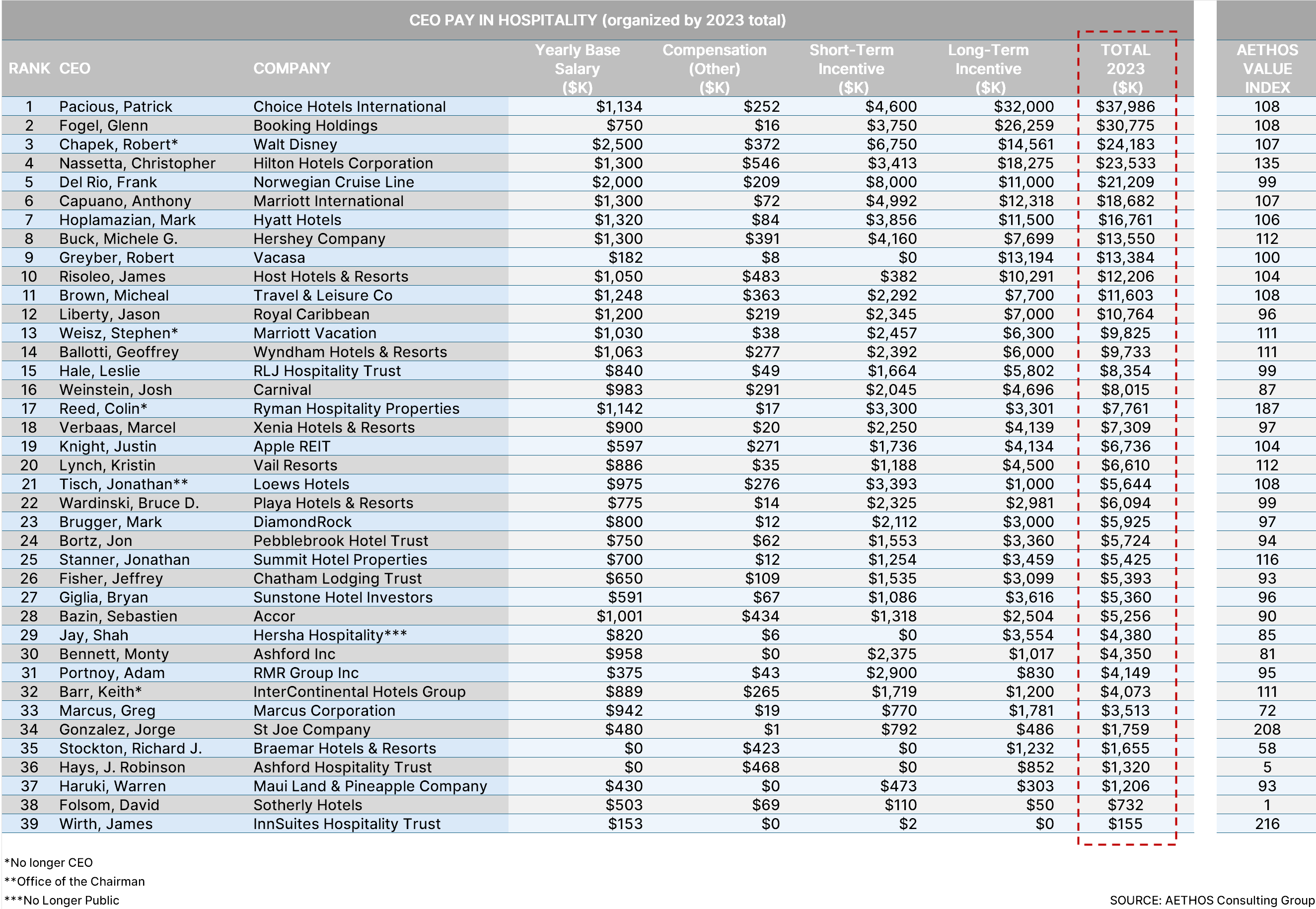CEO Pay in Hospitality 2023
The last time we did our CEO pay study it was pre-Covid, and things were looking very bright. Then the bottom fell out. Now in a post-Covid environment, it’s interesting to see some companies experiencing total recovery, while others have faced longer structural change. For example, public hotel companies, by and large, have had stock prices completely recovered, versus cruise lines, which have seen stock prices that have remained depressed by nearly 50%. Likewise, CEO pay has rebounded in a similar fashion. Pay cuts that happened during the pandemic have come full circle. In fact, the average pay package of a hospitality CEO was USD $9.5M in 2022, up from USD $7.9M in 2019. CEO pay ratios have been a hot topic in the recent auto workers strike and we suspect the same will happen as hotel workers threaten strikes around the country. According to ZipRecruiter, the average annual pay in the hospitality industry was USD $58K in 2022. That equates to a pay ratio of 164 to 1 in hospitality, compared to 300 to 1 in the auto industry.
Although some may consider these pay numbers obscene, we have taken a more practical approach. We believe that supply and demand dictates pay. Most of today’s billionaires have become rich due to entrepreneurial endeavors, not inheritance. Furthermore, most public company CEOs earn a large part of their pay in the form of short and long-term incentives. In our study, 66% of CEO pay came in the form of stock and 23% in the form of annual bonuses. Only 10% came in the form of salary and 1% in other compensation. In theory, if their incentives were based on appropriate pay-for-performance models, the public would not have much to argue with when it comes to CEO pay.
CEO tenure in the hospitality industry was just over 9 years, compared to the average tenure in the Fortune 500 at 7.2 years. There were only 4 CEO transitions in our survey group. Keith Barr announcing his departure from InterContinental Hotels after 30 years, Bob Chapek being fired at Disney in favor of previous CEO Bob Iger, Colin Reed stepping down after 21 years at the helm of Ryman and Stephen Weisz after 26 years with Marriott Vacations and its predecessor.
Within the peer group of hospitality companies, the average market capitalization was USD $12B. Very similar to 2019 numbers. EBITDA numbers remained depressed as an industry but recovered from an average of -USD $47M in 2020 to USD $922M in 2022. Bottom line, the pandemic crushed the industry, but we have bounced back quite well. The median stock price was USD $45 per share in 2020 compared to USD $16 in 2022. Likewise, the average dividend payout dropped from 17 cents to 9 cents. There is clearly some continued recovery necessary in some sectors of the industry. Small-Cap St. Joes was the best stock investment of the 2020-22 period, rising nearly 95%. The worst stocks were the cruise lines along with Sotherly and Ashford.
In terms of pay size, Pat Pacious at Choice Hotels had the largest pay package worth nearly USD $38M. The biggest pay checks generally belonged to the large-cap company CEOs, except for Robert Greyber at start up, Vacasa who was recruited to the company after a 16+ year stint at Expedia. It makes sense that the largest short and long-term incentive payouts generally belonged to the same CEOs as incentives made up so much of overall compensation. The largest short-term incentive was paid to Jack Del Rio, CEO at Norwegian Cruise Lines with an USD $8M bonus. The largest long-term incentive belonged to Pacious at USD $32M. The largest salary was paid to Chapek at USD $2.5M.
As part of our study, we aim to identify CEOs who earned their pay and others who were overpaid according to our pay-for-performance model. The model factors stock and EBITDA growth over a three-year period and compares that to company size and CEO total pay. The result is an index that shows if a CEO was over or underpaid relative to their peers. The best AETHOS Value Index (AVI) belonged to James Wirth at InnSuites, with an AVI of 216. Jorge Gonzalez was next at 208. Both could have seen their pay double in size and still provide good value to shareholders on a pay-for-performance basis. Interestingly, many of the highest paid CEOs earned their lofty paychecks with AVIs hovering around the average of 100. As previously mentioned, the cruise line CEOs along with a couple of small REITs had the lowest value indices. The performances of Colin Reed and Chris Nassetta were worth noting as they both had large pay packages but also two of the highest AVIs. Our hope is to see further recovery across all sectors of hospitality in the coming year.

